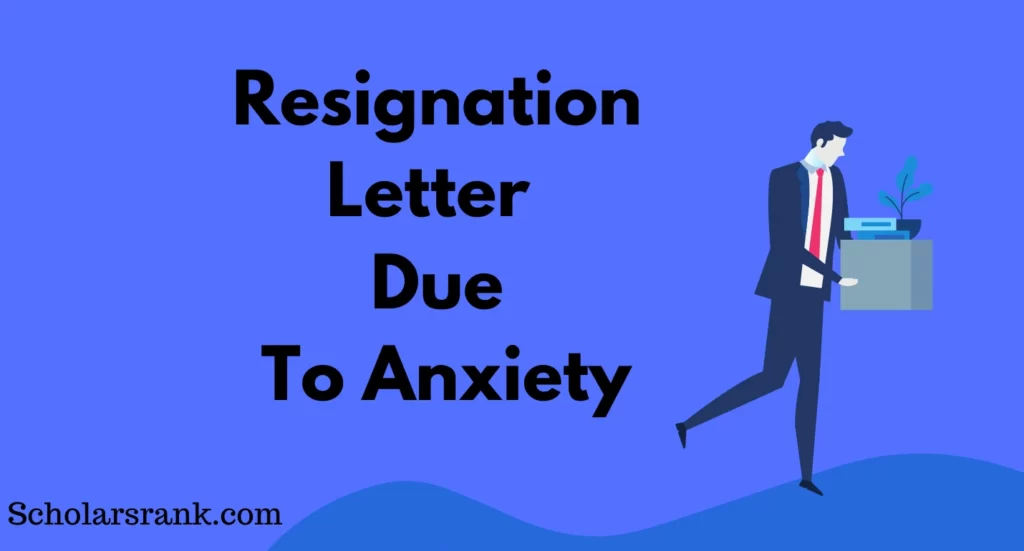A topic of conversation in recent months has been the rise of resignation letter due to anxiety. The relevance of the widely-circulated, poorly-written resignation letter owing to anxiousness is the reason for bringing this write up.
On the other hand, a handful of people do not understand that anxiety can come as a valid reason for tendering a resignation letter. If you fall into any of the categories above, worry not! In this article, I will be sharing proven tips on how to write an acceptable and standard resignation letter due to anxiety. Also, I will be sharing some of the dos and don’ts of a standard resignation letter as well as a sample template. So, follow through as I highlight all of the above-mentioned points.
How To Write a Resignation Letter Due To Anxiety
As I have established above, Anxiety is a valid reason to tender a resignation letter. According to UK psychologists, when you have a feeling of worry or uncertainty about the potential outcome of something, your efficiency at work drops by 60%. Finding yourself in this won’t do you good nor is it going to benefit the firm you work for. This means that the next solution is to tender your resignation letter to better solve your problem. Peradventure you find yourself in this situation below is how to write an acceptable resignation letter due to anxiety:
Start with greetings
A well-written letter of resignation due to Anxiety should begin with greetings to the recipient. Greetings can come in the form of “Dear Mr./Mrs. Oyebamiji (recipient’s first or last name)”. The usage of first name or last name depends on your relationship with the recipient and your level of interaction across the board.
Highlight your resignation statement alongside the resignation date
The main body of your letter should highlight your decision to resign alongside your projected resignation date. The mistake most make is highlighting their decision to resign towards the end of the letter which is not right. Your decision must be highlighted first before going into details as to why you want to resign.
Clearly state your reason for leaving
Another point to note is that you must ‘clearly ‘ state your reasons for leaving. This usually comes in the second or third paragraph. Your reason(s) for leaving must clearly reflect anxiety. Emphasis is placed on “clearly” because you don’t want to sound as though you are threatening the firm or leaving due to internal factors.
Also, you are trying your best not to burn bridges by straining your relationship with the company through an ambiguous statement of purpose rather. Your tone must not come off as though you were not satisfied 2i4h certain company policies which is why you are writing a resignation letter. Rather, you are to write clearly, in simple terms, and in a respectful manner to the recipient.
Be appreciative
Your concluding paragraph should be dedicated to showing appreciation to the recipient for giving you the platform and opportunity to grow and develop your skills while in the company. Also appreciate the company for the experience you have been able to gather over your years of engagement at the company. Optionally, you can decide to organize a dinner or lunch date with your superior to better stay in touch. This should be accompanied by your hotline and personal contacts for easy reach. To better solidify your relationship with the firm, you can find a replacement for your role before your prospective resignation date. This part is not necessary but rather, a choice.
Add valediction and signature
Add valediction ( “Sincerely” or “Best Regards”) and finally, your signature after which your first name and last name follow. If your letter will be sent via email, always address your personal contact information and signature.
Template of Resignation Letter Due To Anxiety
We have highlighted how to write a resignation letter due to anxiety. Now, let’s share a template with you. Please note that the below template was well-researched and vetted by top HR in the industry.
[Employee’s name]
[Your position]
[Company]
[Date]
To:
[Employer’s name]
[Role]
[Company’s name]
Dear [Employer’s name]
This is to officially tender my letter of resignation. Recently, I reached out to a doctor to discuss my anxiety issues and how it has hurt my career. Unfortunately, this was not borne out of internal company problems or strained relationships with coworkers. The pressure at work can not be managed with my condition as advised by the doctor. To get back whole, I need to take a break from work to fully focus on my wellness.
I apologize deeply and hope that we can keep in contact. I’m here to assist with the transition of a replacement. As discussed with the board, my final day of employment will be in three weeks.
Iteratively, I am so sorry to have come to this conclusion and wish the company the best of luck in the search for a replacement.
Sincere regards,
[Employee’s name]
[Signature]
Resignation Letter Due To Anxiety: Dos and Don’ts
Your issues are usually best kept to yourself as you’ve already decided to move on. However, if you think it’s important to talk to someone in the firm about possible displeasure at something or a challenging circumstance at work that prompted your departure, do so.
Try to approach it without any passion and with extreme objectivity. You should concentrate on certain harmful habits. Your trustworthiness will increase if you include some positive feedback in your criticisms.
An open-ended question may provide you the chance to discuss your rationale for parting. Plan an opportunity to debate your issues. It’s preferable to do it at a later date close to your final date of employment to prevent making your final days of employment harder than necessary by upsetting your boss.
After Writing Your Resignation Letter Due To Anxiety, What Next?
You might have submitted your resignation letter due to anxiety and confused as to what to do next. Don’t worry, I’ve got you. Below are things you need to do after you might have tendered your resignation letter due to
Avoid Negativity
You might be caught in between discussing your resignation with your co-workers before the last day at work, what you need to avoid instances like this is not to talk down on the company. Always highlight how much you have benefitted from the company. Only talk about the positives. You have to do this because leaving the company on good terms should remain your objective rather than having a strained relationship.
Extend your goodbyes
You have to send in farewell messages to coworkers before you leave. Let them know you will be leaving the company to focus on something personal to you. Do not reveal personal or sensitive information. It is also important to forward goodbye emails to coworkers alongside your contact information so that you can connect when necessary.
Conclusion
In writing a letter of resignation due to anxiety, clarity of purpose is prioritized. You must not send ambiguous content and use the wrong tones. You need to get the toning right to avoid burning bridges. In future engagement, references from your previous workplace or superiors could prove to be the game-changer hence, why you need to get it right.
You can also read on Writing a resignation letter after six months.








